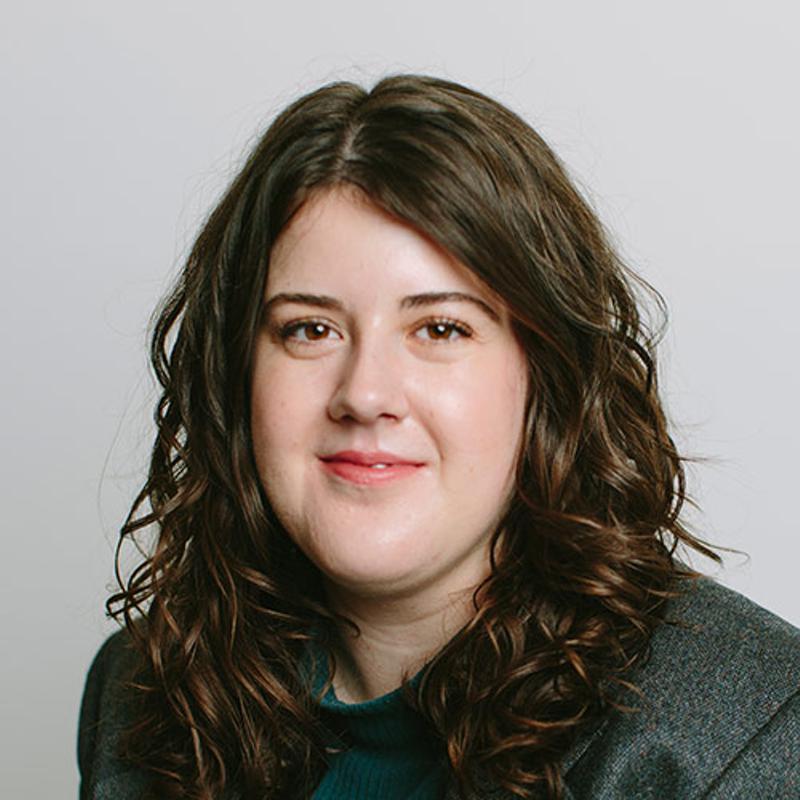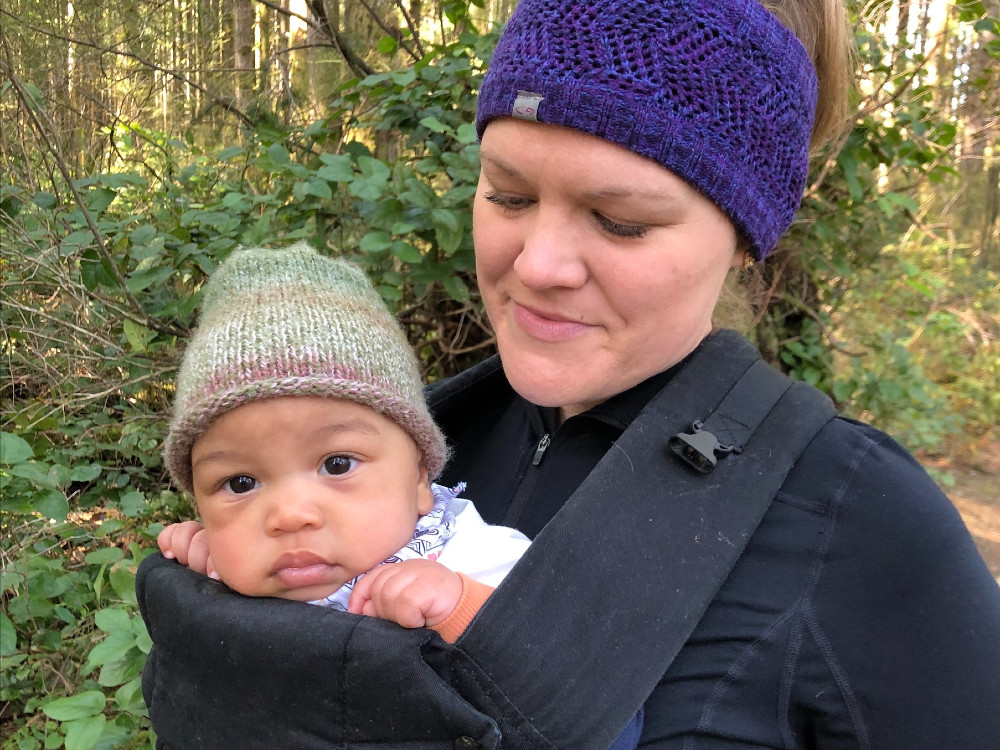Holly Noot had spent eight hours in excruciating labour at home in Courtenay before her midwife said she needed to go to the hospital. Despite frequent contractions, Noot’s baby wasn’t progressing into the birth canal.
It was two in the morning and Noot, 34, was exhausted, stressed and in pain. But all she could think about on the drive to the hospital was how much the delivery was going to cost.
Doctors at the hospital told Noot her baby’s heart rate had dropped and rushed her into the operating room for an emergency caesarean section to deliver her son, Ruben.
“I thought, ‘this is going to cost me a lot of money,' and that’s not something you should be thinking about when you’re in labour,” Noot said in an interview with The Tyee. “Thankfully, we got him out safely.”
Noot is one of a large but unknown number of newly arrived people in B.C. who must pay out of pocket for prenatal, delivery and postpartum care because they are required to wait up to three months for provincial health coverage.
All of Noot’s money has gone towards the more than $14,000 she has been billed for her and her son’s care since he was born on Oct. 24. Noot lives with her parents and contributes to household costs but the bills wiped out her savings and she is still living paycheque to paycheque.
“It just seems a bit archaic to me. Don’t we want to set moms up for success in this world?” she said. “Pregnancy and childbirth are a vulnerable state to be in anyways and then to be having to pay medical bills on top of that is ridiculous.”
B.C.’s Medical Services Plan requires all new residents, including newborn and unborn babies, to wait the remainder of the month they arrive plus two additional months before they have MSP coverage.
The policy applies to Canadian citizens and permanent residents moving from other provinces, immigrants, refugee claimants and people moving back to B.C., like Noot.
B.C. is the only province in Canada where pregnant people and newborns are not exempt from the wait period, and one of just three with any wait time at all.
The goal of the wait period is to prevent people from using the health-care system and leaving without contributing to the tax base that funds it, Health Minister Adrian Dix has said repeatedly.
“While MSP provides medical services to B.C. residents, free at the point of care, it relies upon the taxes of people working in British Columbia to fund its operation,” wrote a spokesperson for the Ministry of Health in an emailed statement to The Tyee.
The Tyee asked what purpose the policy serves given Noot and everyone else who lives in Canada pays taxes from the date they start to earn an income, regardless of citizenship or immigration status.
“The waiting period allows the government to verify the residency status of individuals before they become eligible for MSP coverage to prevent non-residents from seeking medical treatment in B.C. and returning to their usual place of residence,” the spokesperson wrote in a followup statement.
But several experts and mounting academic research say the policy disproportionately deprives pregnant people and their babies of essential care that cascades into poorer health outcomes and costlier emergency interventions.
These effects are particularly acute for racialized women and newborn babies, and in 2021, 19 migrant rights and health organizations again called on it to be repealed.
“Pregnancy can’t wait, and there is an abundance of evidence that this policy isn’t working and is actually harming racialized women in particular,” said Dr. Shira Goldenberg, assistant professor in the San Diego State University School of Public Health and research scientist with the Centre for Gender & Sexual Health Equity in the University of British Columbia faculty of medicine. “But the government is still relying on these fear-based tropes about migration and resources.”
And they say the policy is inconsistent with the province’s stated commitments to human rights, reproductive freedom and gender and racial equity.
Having to wait or pay for care “can be jarring for people when Canada has a reputation for universal health care,” said Dr. Mei-ling Wiedmeyer, a family doctor and reproductive health researcher. “But anyone who works on the ground can see that’s not the case in reality.”
Noot grew up in the Comox Valley and trained as a nurse before moving to London in 2018 for an adventure. She worked as a nurse in a sexual health clinic there for more than three years and paid taxes in both the United Kingdom and Canada until her B.C. residency lapsed in 2020.
But in September 2022, her serious relationship with Ruben’s father ended less than eight weeks before she was set to give birth. The pregnancy had been planned but trying to make ends meet as a single mother in an expensive city like London on only her maternity pay didn’t seem possible.
Noot decided to move back to Courtenay and have her baby there with the support of her parents, which seemed easier than waiting to take a transatlantic flight with a newborn in tow. She arrived on Sept. 11.
She knew the MSP waiting period existed but figured she would easily get it waived given her circumstances and previous residence status. Private insurance options didn’t cover pre-existing conditions, including pregnancy.
There are some grounds for the Medical Services Commission to grant exceptions to the wait period, including when a medical condition is diagnosed after someone arrives in B.C. But pre-existing conditions, including pregnancy, aren’t eligible for a waiver, the ministry’s spokesperson wrote.
Last year, the MSC received 340 waiver requests and reviewed 100 of them, 33 of which were pregnancy-related, according to information from the Ministry of Health. The spokesperson declined to say how many of those 33 were granted, citing privacy concerns.
Noot’s application was among those denied. She applied for MSP for herself and Ruben immediately when she arrived in B.C., and then filed a waiver request for both of them. But it was rejected by the Medical Services Commission, as was her request to have at least some of the costs waived due to financial hardship.
Both of them became eligible for MSP on Dec. 1. On March 8, the MSC granted Noot’s request to waive Ruben’s wait period, which will knock about $1,000 off her bills.
In the decision letters reviewed by The Tyee, MSC wait review committee chair Kate Puckett explained that routine prenatal care and routine births, including caesarean births, do not qualify for a waiver as their costs are not considered unexpected.
When asked by The Tyee why an emergency C-section is considered “routine” care, the ministry spokesperson wrote that about one third of births result in a caesarean section in B.C.
“We would like to extend our sympathy for the difficult life circumstances the individual concerned is experiencing,” wrote the ministry spokesperson to The Tyee, noting the waiver process is in place to safeguard against “the potential hardship the wait period may pose for some individuals, particularly for those with urgent health-care needs.”
Non-profit migrant rights group Sanctuary Health has been advocating to remove the wait period’s removal for years and ramped up its campaign as B.C. temporarily waived it for citizens and permanent residents returning to Canada and temporary foreign workers early in the COVID-19 pandemic. Last year, the province announced it would waive the wait period for Ukrainian refugees fleeing Russia’s war as well.
“It shows they can waive it, so why only for Ukrainians? We should do the same for everybody,” said Sanctuary Health organizer Omar Chu. The waiver itself is inaccessible for people without the time or language skills to complete it, he added, if they know about the option at all.
And pandemic-related citizenship and immigration delays have worsened coverage gaps for new residents, according to organizer Chu. Many waiting overseas for a visa or permanent residence can’t know when it will come and when they will have to be in the country, let alone when they will give birth.
And each time someone’s status changes or lapses, like when someone moves from a student visa to a work permit, the wait period begins again. People who are undocumented are never eligible for MSP coverage, but their Canadian-born babies are entitled to it once the wait period is up.
Goldenberg and Wiedmeyer's research at the Centre for Gender & Sexual Health Equity has shown the policy disproportionately deprives racialized immigrant women and their babies of essential health care and women feel it uses their immigration status to decide who is deserving and undeserving of care.
The women interviewed reported avoiding health care due to the costs, and feeling unwelcome or undeserving of care even when they became eligible.
“They’re just trying to get the health care they deserve, because they’re people,” Wiedmeyer said. "More often than not we’re taking advantage of their vulnerability by putting them into insecure low wage work others won’t take and then looking the other way.”
This affects every aspect of health care, but pregnancy and infancy are particularly vulnerable and critical stages for lifelong health, Wiedmeyer said. Infections and birth complications can have lifelong impacts on children and parents without early detection and intervention, usually in a hospital.
In her clinical work with uninsured people, she can’t recommend the same prescriptions or interventions she normally would to someone with MSP. “It’s an incredibly challenging scenario for a parent to try to make a judgment about whether or not it’s bad enough to take the risk of incredibly high charges by taking their child to the hospital,” said Wiedmeyer.
And Noot’s case illustrates that everyone is harmed by the policy regardless of their citizenship, said Goldenberg and Wiedmeyer.
Instead of a hospital birth, she planned a home birth with a midwife to keep costs low. She also skipped an ultrasound she would have otherwise gotten to avoid the bill.
After he was born, Ruben needed two revision surgeries to correct his tongue-tie and Noot opted to go home one night earlier than would usually be advised given the cost. Noot also delayed getting care for an infection with her surgical incision until she could see an obstetrician to avoid an emergency room bill.
There is also no limit on how much doctors and specialists can charge for services not covered by MSP, which can mean they charge exorbitant prices or refuse service for fear of not being paid.
Hospitals, which may set up payment plans, often send that debt to collections at a loss when people cannot pay their bills, Chu added. “It’s just downloading the costs to people and the hospitals.”
In 2021, Goldenberg and Sanctuary Health submitted a report on the policy’s harms to immigrant and migrant women to the MSC. It was reviewed and discussed, according to a freedom of information request Chu filed, but the contents of the discussion were heavily redacted.
While there hasn’t been a full cost analysis of the policy, Chu pointed to positive impacts and cost savings from Ontario and Quebec temporarily extending health coverage to undocumented people and those with precarious status during COVID-19.
Noot plans to take the full year of maternity pay and return to work as a nurse when Ruben is old enough.
She hopes the wait period will be removed, at least for pregnant people and newborns, so that no one else will go through the stress she has faced.
“In this day and age, it’s a slash against women’s health,” said Noot. “I’m grateful for all the care I’ve received, but pregnancy should not be penalized.” ![]()
Read more: Health, Rights + Justice

















Tyee Commenting Guidelines
Comments that violate guidelines risk being deleted, and violations may result in a temporary or permanent user ban. Maintain the spirit of good conversation to stay in the discussion and be patient with moderators. Comments are reviewed regularly but not in real time.
Do:
Do not: